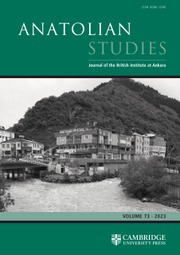Article contents
A late antique ceramic workshop complex: evidence for workshop organisation at Sagalassos (southwest Turkey)
Published online by Cambridge University Press: 29 June 2016
Abstract
Sites of ceramic production have been discovered throughout the area that was once the Roman Empire; as a result, it is becoming increasingly clear that this industry was, in the Roman and late antique worlds, organised in numerous ways. In consideration of the organisational diversity in ceramic production attested during the period, this article presents some of the findings from the excavations of a late antique complex of ceramic workshops at the site of Sagalassos in order to consider archaeological evidence in terms of, not only the organisation of the manufacturing process, but also structures of workshop decision-making. Several lines of archaeological evidence are outlined, and argue for a model of independent work units integrated into a larger organisational structure of decision-making, and possibly even ownership, across the complex. In addition, the motivation to invest in a multi-workshop complex during the late antique period at Sagalassos is contextualised within the wider history of local and regional economic development.
Özet
Bir zamanlar Roma İmparatorluğu olan bölge genelinde seramik üretim yerleşimleri tespit edilmiştir ve sonuç olarak, Roma ve geç antik dünyada bu endüstrinin çeşitli şekillerde düzenlendiği giderek daha açık hale gelmektedir. Bu dönemler için tespit edilen seramik üretimindeki çeşitlilik dikkate alınarak, bu makalede Sagalassos yerleşiminde bulunan geç antik döneme ait seramik atölyesi kompleksinde yapılan kazılarda ele geçen bazı buluntular sunulmaktadır. Bu arkeolojik kanıtlar, sadece üretim sürecinin düzenlenmesi açısından değil aynı zamanda atölye karar verme mekanizmaları bakımından da ele alınmaktadır. Pek çok arkeolojik kanıt özetlenmiş ve kompleks genelinde bağımsız iş birimlerinin daha geniş bir karar verme örgütsel yapısına dahil olması ve hatta belki mülkiyeti de kapsayan bir model öne sürülmüştür. Buna ek olarak, Sagalassos’da geç antik dönemde birden çok atölye bulunan bir komplekse yatırım yapma eğilimi, yerel ve bölgesel ekonomik gelişimin daha geniş tarihi içinde ele alınmıştır.
- Type
- Articles
- Information
- Copyright
- Copyright © The British Institute at Ankara 2016
- 7
- Cited by




